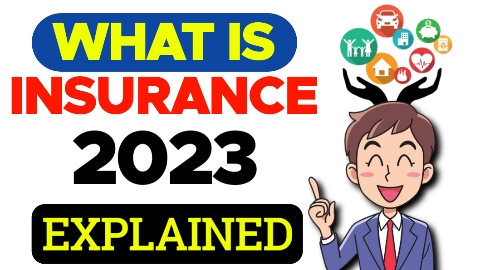Insurance is a contract between an individual or an entity (the policyholder) and an insurance company, in which the policyholder pays a premium in exchange for protection against financial losses. The insurance company assumes the risk of loss and agrees to compensate the policyholder for covered losses or damages that may occur, up to the limits of the policy.
Insurance policies can cover a wide range of risks, including property damage, liability for personal injury or damage caused to others, loss of income due to disability or illness, and death benefits. The terms and conditions of the policy, as well as the amount of coverage, premiums, and deductibles, are spelled out in the insurance contract.
The purpose of insurance is to provide financial protection and peace of mind to policyholders, by transferring the risk of loss from the individual or entity to the insurance company. By paying a relatively small premium, individuals and businesses can protect themselves against potentially catastrophic losses and ensure that they are able to recover from unexpected events.
How Many Types Of Insurance In India :
In India, there are various types of insurance policies available that cater to different types of risks and requirements of individuals and businesses. Here are some of the main types of insurance policies available in India:
Life Insurance – It provides financial protection to the policyholder’s family in the event of the policyholder’s death. It can be term insurance, endowment plans, money-back plans, whole life insurance, etc.
Also Read : How to get cheap car insurance plan
Health Insurance – It provides coverage for medical expenses incurred by the policyholder due to illness or accident. It can be individual health insurance, family floater health insurance, critical illness insurance, etc.
Motor Insurance – It provides coverage for damages or losses caused to a vehicle or its occupants due to accident or theft. It is mandatory in India for all vehicles to have third-party liability insurance, and comprehensive insurance is also available.
Home Insurance – It provides coverage for damages or losses caused to a home and its contents due to natural disasters, fire, theft, etc.
Travel Insurance – It provides coverage for medical expenses, trip cancellations, lost luggage, etc. during domestic or international travel.
Business Insurance – It provides coverage for various risks faced by businesses, such as property damage, liability, loss of income, etc.
Also Read : What is Life Insurance
Crop Insurance – It provides coverage to farmers against crop loss due to natural disasters, pests, etc.
Marine Insurance – It provides coverage for losses or damages caused to ships, cargo, and other marine-related risks.
These are some of the common types of insurance policies available in India, and there may be other types of insurance policies available as well, depending on the specific needs and requirements of individuals and businesses.
What Is The Minimum Criteria To Start Insurance :
The minimum criteria to start an insurance policy in India depends on the type of insurance you want to purchase.
For life insurance, the minimum age of the policyholder is generally 18 years, and the maximum age can range from 50 to 70 years, depending on the type of policy. The policyholder needs to provide personal details such as name, age, gender, occupation, income, etc., and undergo a medical examination in some cases, depending on the age and sum insured.
For health insurance, the minimum age of the policyholder can be as low as 3 months, and there is generally no maximum age limit. The policyholder needs to provide personal details, such as name, age, gender, occupation, medical history, etc. Some insurance companies may require medical tests for individuals above a certain age or for those applying for a high sum insured.
For motor insurance, the minimum age of the vehicle owner and driver is 18 years, and the vehicle needs to be registered with the Regional Transport Office (RTO). The policyholder needs to provide details of the vehicle, such as make, model, registration number, year of manufacture, etc.
Also Read : How to create PhonePe account
For home insurance, the policyholder needs to be the owner of the property or have an insurable interest in the property. The policyholder needs to provide details of the property, such as the type of property, location, construction, etc.
For business insurance, the policyholder needs to provide details of the business, such as type of business, turnover, employees, etc.
In addition to the above, the policyholder needs to pay the premium for the policy, which varies depending on the type of insurance and the coverage amount.

